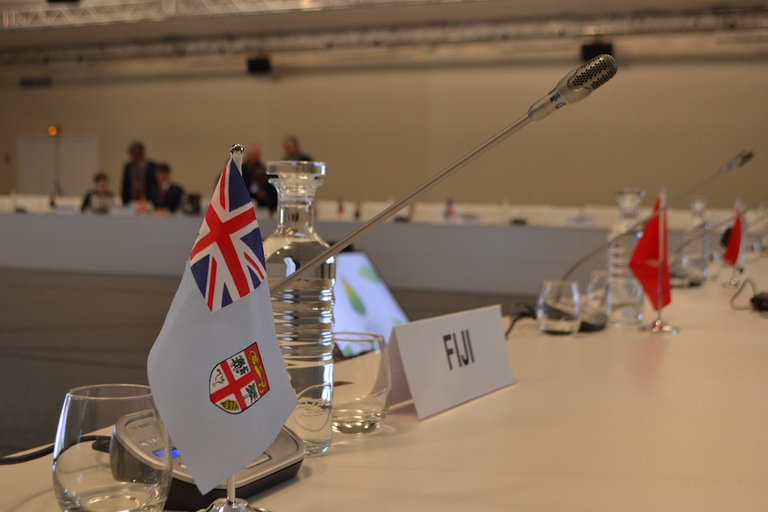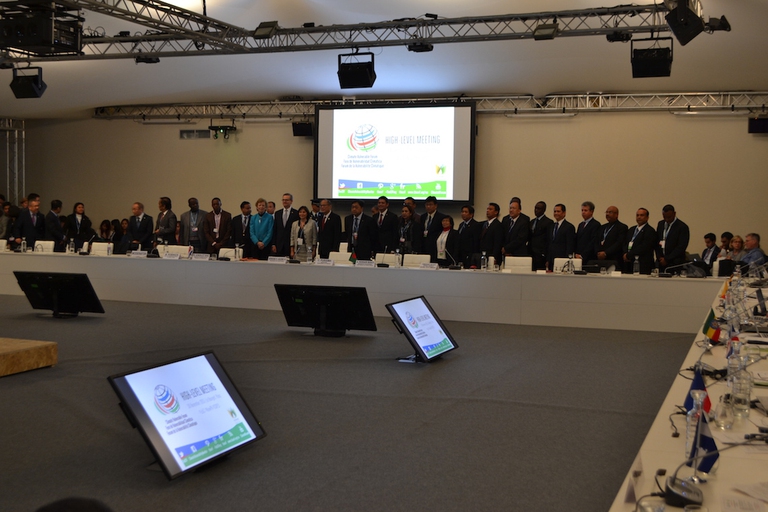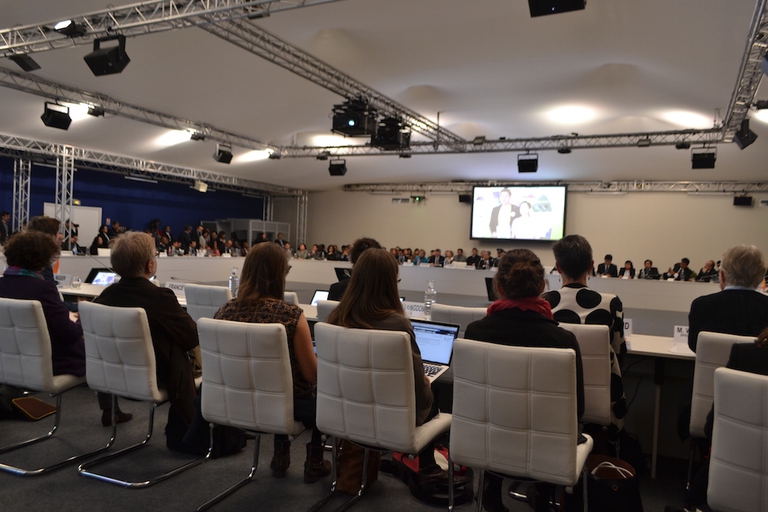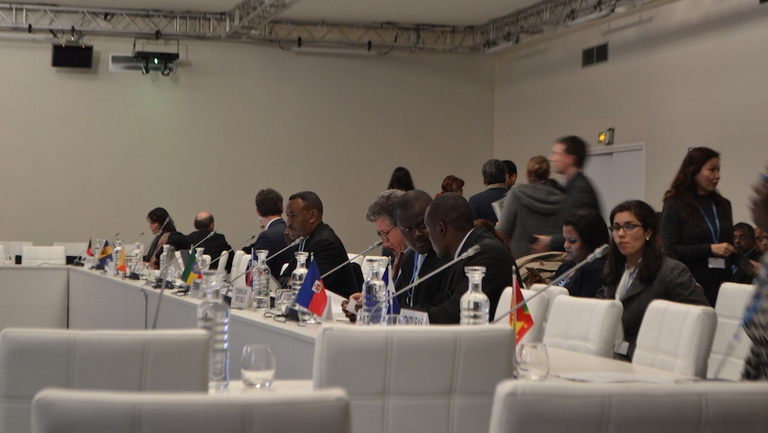
The 26th edition of the United Nations Climate Change Conference, COP26, will be held in Glasgow, Scotland in November 2020. The pre-COP will take place in Milan, Italy.
I paesi che compongono il “Climate Vulnerable Forum” si sono riuniti alla Cop 21. Lanciando al pianeta un monito: alziamo l’asticella o sarà la catastrofe.
“This emergency affects the entire world, not only us. Nobody’s immune to climate change”. These are the words of the member countries of the Climate Vulnerable Forum, entity gathering the countries most threatened by climate change: Nepal, Bangladesh, Maldives, Ethiopia, and the Republic of Kiribati, among others.
Their representatives met in Paris at COP21. The President of the Philippines, Begnino Aquino, has reminded how his country, over the last few months, has been affected by the worst typhoons so far: “Facing climate change is not a philosophic choice, but a necessity. Our commitment alone is not enough: global solidarity is essential to face this challenge. We all have to give our contribution, even if that means changing part of our current way of life”.
Manila’s Secretary of Finance, Cesar Purisima, said that “if no action is taken, 50% of the global economic impact caused by climate change will be a burden of the most vulnerable countries. We estimate we are going to lose 2.5% of our GDP each year”. For these reasons, the countries of the Forum clearly urged that COP21’s results should be more ambitious than declared: “Our group propose a commitment to limiting the average global temperature rise to 1.5°C by the end of the century, rather than 2°C, in order to avoid catastrophic consequences”.
It is an ambitious goal, considering the slight disagreement observed during the first hours of talks. China has reaffirmed, for instance, that developed countries must keep their promises and fund adaptation policies in the South of the world. India agreed. Industrialised countries pledged to increase their aids to 100 billion dollars a year by 2020, but the recipients of the funds asked guarantees of the fact that such promise will be fulfilled.
In the meanwhile, 11 countries (including the United States, Italy, Germany, and the United Kingdom) have announced the allocation of 248 million dollars for the Least Developed Countries Fund (LDCF), in order to support their adaptation to climate change. Moreover, France has declared its will to “guarantee to 80 vulnerable countries the installation of early-warning systems for extreme weather events by 2020. This would mean safeguard about 1 billion people all over the world”. And the World Bank has presented a programme, supported by Germany, Sweden, Switzerland, and Norway, aimed to help developing countries to cut their greenhouse gas emissions.
Despite this, the economic issue is likely to remain a complex crux. Nobody wants to pay a lot. Yet, according to Manuel González Sanz, Foreign Minister of Costa Rica, “over the past few years our country has significantly reduced its emissions. In parallel, we’ve registered a great economic growth. And the Human Development Index (United Nations index that assesses countries’ wealth, editor’s note) has increased: it’s thus not true that who is committed to safeguarding the environment then has pay off such choice economically”. There are no excuses, “Big and small countries must act”.
BREAKING : 47 pays dits “vulnérables” adoptent une position commune en faveur du 100% d’énergies renouvelables d’ici 2050 #COP21
— Greenpeace France (@greenpeacefr) 30 Novembre 2015
How? As for the countries most threatened by climate change there’s only one choice: they have to invest in renewables, which should become the only energy source by 2050. This is the idea of 47 endangered countries, which seem ready to follow French President Francois Holland’s advice: “The greatest danger is not that we aim too high and that we miss, the greatest danger is that we aim too low and hit it”.
Siamo anche su WhatsApp. Segui il canale ufficiale LifeGate per restare aggiornata, aggiornato sulle ultime notizie e sulle nostre attività.
![]()
Quest'opera è distribuita con Licenza Creative Commons Attribuzione - Non commerciale - Non opere derivate 4.0 Internazionale.
The 26th edition of the United Nations Climate Change Conference, COP26, will be held in Glasgow, Scotland in November 2020. The pre-COP will take place in Milan, Italy.
Thanks to activists, the voice of the world’s peoples resounded through the COP25 like an alarm bell. Governments didn’t reach the results they demanded, but their cries and messages were stronger than ever, reaching even those who weren’t in Madrid.
Climate change poses a risk for millions. However, women are the most vulnerable to its negative consequences: a few simple considerations by the Italian Climate Network help us perceive the global implications of this.
The COP25 ended two days late and with very few steps ahead made. Climate negotiations in 2020 will be an uphill battle as political will clearly seems to be lacking, once again.
The last ten years have been the most “exceptional” and hottest decade ever, with extreme weather hitting people and ecosystems harder and more frequently. 2019 is also on course to becoming the second or third hottest year since records began.
Unite Behind the Science: this was the title of the conference held at the COP25 on 10 December. Greta Thunberg’s presence filled the arena, but this time it was scientists’ turn to speak.
25,000 delegates meet for the COP25 from 2 to 13 December. What can we hope this UN climate change conference, whose venue was changed from Santiago de Chile to Madrid, will achieve?
100 eminent people from all over the world, including Vandana Shiva, Naomi Klein and Noam Chomsky, have signed an open letter after the disappointing results of the COP24. A call-to-arms for climate against world leaders’ indifference.
The outcome of the COP24 in Katowice left many unsatisfied. Greta Thunberg, a young Swedish environmental activist, gave a harsh, heartfelt speech addressing world leaders.











